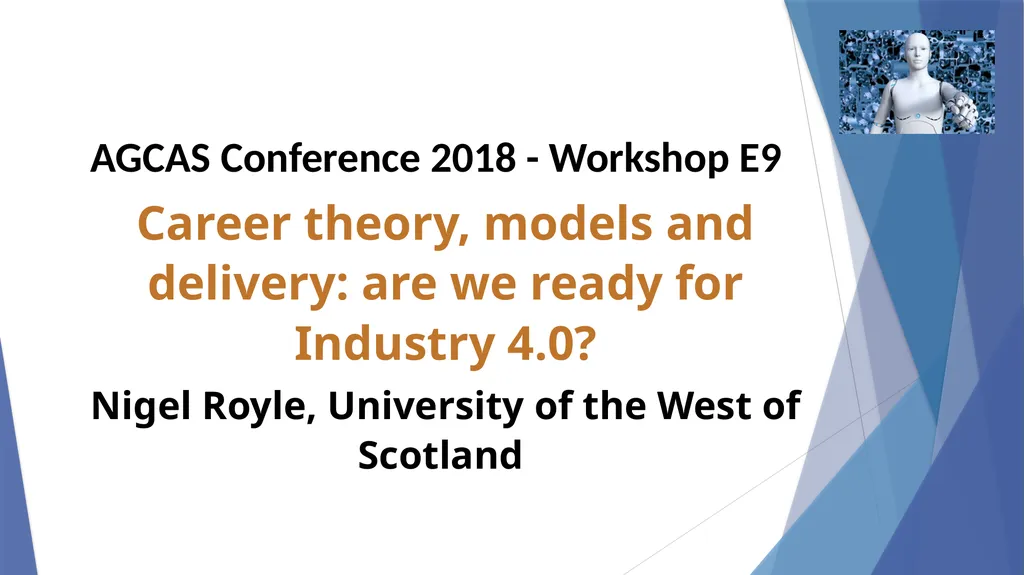AGCAS Conference 2018 - Workshop E9 Career theory,
Author : briana-ranney | Published Date : 2025-06-23
Description: AGCAS Conference 2018 Workshop E9 Career theory models and delivery are we ready for Industry 40 Nigel Royle University of the West of Scotland Estimates for UK jobs at high risk of automation vary between 38 Frey Osborne2013 and
Presentation Embed Code
Download Presentation
Download
Presentation The PPT/PDF document
"AGCAS Conference 2018 - Workshop E9 Career theory," is the property of its rightful owner.
Permission is granted to download and print the materials on this website for personal, non-commercial use only,
and to display it on your personal computer provided you do not modify the materials and that you retain all
copyright notices contained in the materials. By downloading content from our website, you accept the terms of
this agreement.
Transcript:AGCAS Conference 2018 - Workshop E9 Career theory,:
AGCAS Conference 2018 - Workshop E9 Career theory, models and delivery: are we ready for Industry 4.0? Nigel Royle, University of the West of Scotland Estimates for UK jobs at high risk of automation vary between 38% (Frey Osborne2013) and 12% (Nedelkoska and Quintini, 2018). Roberts, Lawrence and King (2017) estimate that 60% of occupations have 30% of tasks that can be automated. Jobs affected are not confined to lower routine skill levels due to artificial intelligence and machine learning – a threat to the graduate jobs and the professions (Susskind and Susskind 2015) Soaring inequalities in income levels whereby the dividends of technology go to a smaller number of owners and highly skilled workers to the exclusion of others. Women and minorities are over represented in job roles at higher risk of automation. (Roberts, Lawrence and King, 2017) Background: Methodology: Semi-structured interviews 6 HE careers advisers specialising in business disciplines asking questions about models and practice 3 experts on the graduate labour market Interview transcripts will be analysed using thematic analysis to identify themes and patterns of responses Two relevant case studies will be developed Are the models of career development and practice of careers guidance delivery adapted to meet the needs of students in this period of rapid change? What are the assumptions careers advisers make about careers, job roles and the nature of work and do they take account of changing future scenario? Does practice take account of the idea that automation may impact genders and other groups disproportionately? Are there ways that careers advisers challenge or mitigate the effects of trends that could lead to greater inequality and a decline in working conditions for some workers? References Ross, A. (2016) The Industries of the Future. New York: Simon and Schuster, Frey, C.B and Osborne, M.A (2016) The Future of Employment: How Susceptible are Jobs to Computerisation? Oxford: Oxford Martin Nedelkoska, L. and Quintini, G. (2018) Automation, skills use and training OECD Working paper Susskind, R. and Susskind, D. (2015) The Future of the Professions how Technology will transform the work of human experts Oxford: Oxford University Press Roberts C, Lawrence M and King L (2017) Managing automation: Employment, Inequality and Ethics in the Digital Age, IPPR. [on line] available: http://www.ippr.org/publications/managing-automation Accessed 29.12.2017 Research Questions: “Robots can be a boon , freeing up humans to do more productive things – but only so long as Humans create














